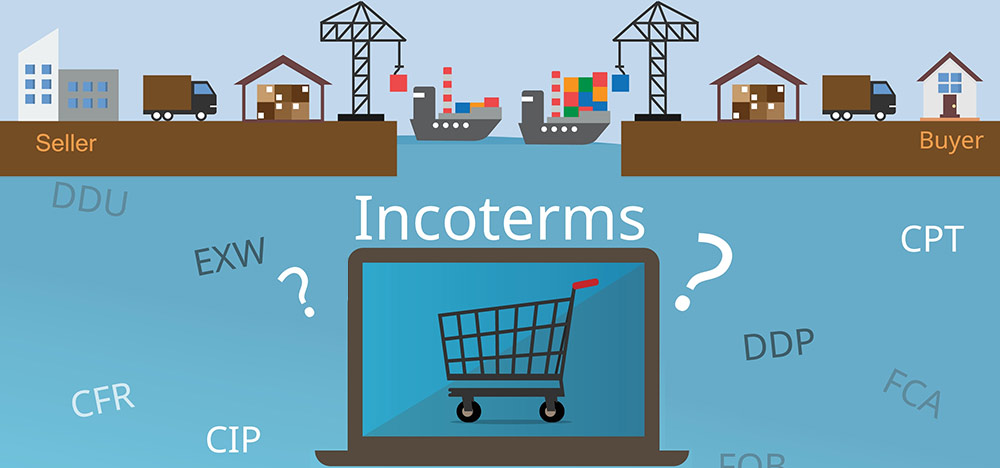You have products that need to get to customers across the world. What is one way to help ensure that your merchandise will reach the appropriate location through international shipping?
One word: Incoterms. Derived from “international contract terms,” incoterms, as they’re commonly known, are a group of predefined commercial terms pertaining to international commercial law — and in particular, the universalization of the procedures and regulations associated with international exporting and importing of goods. They’re published by the International Chamber of Commerce (ICC).
Incoterms are not mandatory, but they are globally accepted — and help eliminate language barriers. Therefore, they’re recommended by international lawyers, trade councils, and courts when shipping products across international borders. By not incorporating incoterms, there is a risk for a breach in the contract between the merchant and the customer, possibly leading to a variety of issues ranging from delivery and payment difficulties to disputes and legal issues if there is an error in customs declarations.
Today, there are 11 incoterms, all of which have a three-letter acronym attached to them — with seven relating to all forms of travel and four connected only to sea and inland waterway transport. According to the United Nations Conference on Trade and Development, approximately 80 percent of global trade by volume and more than 70 percent of global trade by value go through maritime shipping and seaports across the globe.
Let’s take a brief look at some of the more widely used incoterms.
CIF (Cost, Insurance and Freight)
This is the most commonly used incoterm worldwide. It represents a balanced arrangement between the merchant and the customer. Under the incoterm, a merchant generally provides transportation up to the customer’s destination, with the additional service added into the cost of the product(s). The merchant does not have to worry about the risk of the products being lost or damaged when en route, though, because the risk shifts to the customer at the point of origin.
Furthermore, the customer can take comfort knowing that the products are delivered to his or her port of choice. While the customer absorbs the risk when the product is in transit, CIF mandates that the merchant supplies a minimum level of insurance.
FOB (Free on Board)
FOB (Free on Board) is another incoterm for maritime shipping only. Under this incoterm, the merchant transports the products on board a ship at the shipment’s port. The customer then selects the ship to be used and pays for the freight of the product.
Thus, any transportation risks go from the merchant to the customer when the product is brought onto the ship. All export customs clearance is handled by the merchant.
DDP (Delivered Duty Paid)
DDP (Delivered Duty Paid) is an incoterm that applies to all forms of transit. It states that the merchant will transport the product to the home country of the customer. In doing so, all risks and costs associated with the transportation (such as customs clearance) are placed upon the merchant.
Furthermore, if something happens to the product in transit and the item needs to be replaced, the merchant will do so at no extra cost to the customer. This particular incoterm has turned into the gold standard when it comes to international e-commerce orders.
Other Types of Incoterms
There are eight other incoterms that have been published by the ICC. They are listed below in alphabetical order. You can download a guide from the ICC that explains each incoterm in detail through the organization’s website.
- CIP: Carriage and Insurance Paid To (any mode of transit)
- CFR: Cost and Freight (sea/inland waterway transport)
- CPT: Carriage Paid To (any mode of transit)
- DAP: Delivered at Place (any mode of transit)
- DPU: Delivered at Place Unloaded (any mode of transit)
- EXW: Ex Works (any mode of transit)
- FAS: Free Alongside Ship (sea/inland waterway transport)
- FCA: Free Carrier (any mode of transit)
Disadvantages of Incoterms

Although incoterms can be extremely helpful with international shipping, there are some possible pitfalls to note. For one, under those in “Group C” — the four that start with “C” — the merchant must take on the responsibilities of paying for all insurance and freight costs, thus making the customer susceptible to inflated overall costs. In certain situations, the merchant may neglect to itemize individual products for additional insurance, freight, and currency fluctuation.
Furthermore, incoterms also do not cover the transfer of titles or ownership or goods, so there can be a delay — especially when the customer is purchasing a large, expensive item. Other items not covered under incoterms include:
- Address all the conditions of a sale
- Identification of the goods being sold nor list the contract price.
- Reference the method nor timing of payment negotiated between the merchant and customer.
A complete list of the other items not covered can be found through a reference page published by the U.S. International Trade Administration (ITA).
In Summary
Incoterms have proven to provide a very useful framework from which to engage in international commerce, but they do not come without their intricacies and challenges — especially if you are just beginning to sell products in the international market.
When jumping into the realm of international shipping, it pays to seek the knowledge, expertise, resources, and pre-established global networks of an experienced supply chain technology and management company.
At Nexterus, we have an entire international team devoted to helping our clients navigate the obstacles associated with international freight, such as customs, optimal product line analysis, and shipment configuration. We book all shipments with qualified, cost-effective, and efficient carrier providers — and arrange all shipment details for our clients’ import and export needs.
We also manage all freight forwarding, customs clearance, government compliance advice, and shipment tracking requirements; while using a massive global network found in every developed country in the world to help arrange daily logistics between countries outside of the United States.
In short, we give you less to worry about, so you can focus on the growth of your business, not the status of your shipped products.
Contact us today to talk about how we can help your business beyond international borders.



